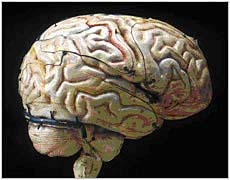|
||||||||||
|
|
Human Brain: Activate Your God-Spot By Dr. Ebrahim Kazim ( Dr. Ebrahim Kazim is a medical doctor and the founder and director of the Islamic Academy in Trinidad, West Indies. He is an author of several books. His articles on Islam have appeared in leading Islamic magazines in the world. He is a member and patron of the Islamic Research Foundation International, Inc. Any e-mails addressed to the author will be forwarded to him by contacting IRFI at president@irfi.org )
The Difference Between Brain, Body and Soul
Although it is said that the temporal lobe houses the God-spot and is the seat of a God-given human faculty for experiencing the divine, it is only acting as an antenna. It is not the locus of a person’s soul (Rūḥ), although Allah breathed His Rūḥ into the first man - Adam. The Rūḥ has an existence independent from the brain and the rest of the body.
There are very real differences between brain, body and soul. Whenever we feel carried away and transported to another scenario by intense prayer and an uplifting ritual, it is reflected in activity in the temporal lobe with changing of the frequency and amplitude of the brain waves as seen in the electro-encephalogram. Moreover, brain imaging techniques such as fMRI (Functional Magnetic Resonance Imaging) and PET (Positron Emission Tomography) which are presently being used to locate and map out the different areas of the brain during prayers and meditation show activity in some areas while other areas in the brain are blanked off. The prefrontal cortex of the brain, which is the seat of attention, lights up, and the superior parietal lobe, (acting as the "orientation association area," which processes information about where our 3-dimensional body stands in space and time, and which is situated towards the top and back of the brain) is switched-off, and so is the amygdale, which registers fear and anger by monitoring the environment for threats and dangers.
Experimentally, bursts of electrical activity could be triggered in the temporal lobes through mini-electrodes, which produce sensations described by the patient as supernatural or a sense of the divine. Such brain storms can also appear in times of personal crisis and hypoglycemia (low blood sugar) suggesting a reason that some people "find God" in such moments.
However, losing one's self in prayer and feeling good or uplifted have nothing to do with how well we communicate with God. In fact, many people pray best when harm afflicts them (Qur’an 41:51) and they feel guilty, shameful or sad. The sheer habit to pray may also be more affirmative than the occasional feeling that God is close by and listening to us.
Some scientists are not sure whether the brainwaves create God or God creates the brainwaves, though they admit that both prayers and meditation give rise to a relaxed dualistic mind with intense feelings of love and joy when both excitatory and inhibitory neurotransmitters in the brain come into play to exert their biological and emotional effects. To the average man, it is a matter of faith. To a Muslim, everything is from Allah.
Thank Allah
Some studies have found no benefit at all from third-party prayer because, they say, it puts God to the test instead. However, the benefits of prayer and meditation to the individual himself are cumulative, leaving their footprints in the neural pathways. Hence, the importance of introducing children to prayers at an early age (Ḥadīth). No matter how we take it, we must thank G.O.D. (the Great Organizing Designer) Who gifted us with a brain equipped with different centers and neurotransmitters so that we could think of the divine and be confident, calm and comfortable. The first to mature is that part of the brain controlling movement and senses followed by language, while the center for attention, reasoning and problem-solving is the last to mature, which leads to wisdom. Executive activities which are prioritized in the prefrontal cortex don't fully develop until young adulthood. The hyper-religiosity of some individuals has been attributed by some researchers to various grades of temporal lobe epilepsy (TLE). Approximately a quarter of TLE patients have intense religious experiences during seizures, saying that they had an aura preceding the attacks that relate to God, such as hearing a divine voice or seeing a divine vision. Although some non-Muslim scientists have labeled some prophets and some mystics as suffering from temporal-lobe epilepsy, recent studies have cast doubt on the connection between religiosity and temporal-lobe epilepsy (the latter disease presenting itself in a fascinating array of symptoms sometimes referred to as supernatural). Laws of the land make human beings behave differently than they would have otherwise. Faith in God results in different behavior. There is no harm in such knowledge of neuroscience co-existing with a person’s faith. Muslims accept that even scientific inspiration comes to us from higher sources; Allah. When prayers and meditation are repetitive, the various neuro-transmitters may stimulate growth of some dormant neurons in the brain to develop a higher centre on the evolutionary ladder of the present day cerebral cortex with a capacity to think and to rationalize much better. Religion Linked to Better Mental Health It is to be noted that, until 1994, the American Psychiatric Association officially classified strong religious belief as a mental disorder, but now they believe that religion is linked to far better mental health.
When we feel carried away by intense prayer and have an uplifting ritual, it is reflected in activity in the temporal lobe. Mystics describe their experiences as ecstatic and serene, and they show utmost humility, while psychotics, schizophrenics and epileptics experience hearing the same voice with the same message during their bouts of illness. Although such persons are confused and frightened by these hallucinations, they see themselves as prophets or even God with special divine powers. However, mystical experiences can also come to anyone spontaneously without desiring them. The reader may refer to the Qur’anic verses 40:15 and 16:2. Having religious faith can speed recovery from depression in older patients. Religiously active older people tend to have lower blood pressure than those who are less active, and live longer. Religion is not only meditation and prayers. It is much more than that such as fasting, charity, visiting widows and orphans, and looking after their welfare.
|
|||||||||

